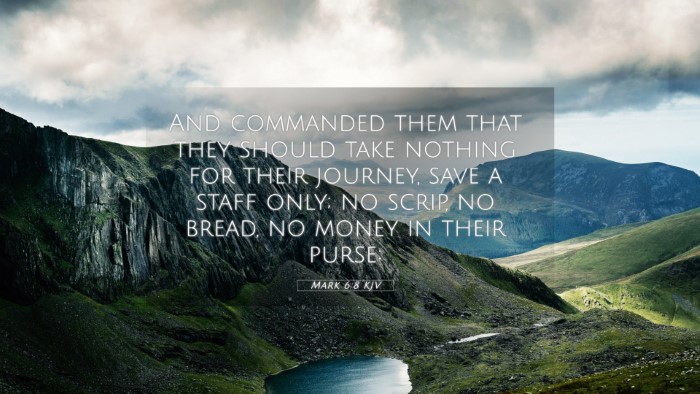Understanding Mark 6:8
Bible Verse (Mark 6:8): "And commanded them that they should take nothing for their journey, save a staff only; no scrip, no bread, no money in their purse."
Summary of Meaning
This verse details Jesus' instructions to his disciples as He sends them out to preach the Gospel. The specific prohibitions against taking extra provisions highlight the importance of faith and reliance on God for their sustenance during their mission.
Commentary Insights
-
Matthew Henry: He emphasizes that by sending them without provisions, Jesus teaches His disciples to rely on God's providence. They were to travel light, focusing on their mission rather than material concerns.
-
Albert Barnes: Barnes notes that the staff symbolizes support and authority while showing that the disciples were to trust in God and not in material items. By limiting their belongings, they were barred from distractions and focused on their divine task.
-
Adam Clarke: Clarke interprets the verse as a sign of Jesus’ intent to instill a sense of urgency and reliance on divine assistance, reinforcing that the ministry itself should be paramount, not the logistics of travel.
Significance of the Instructions
The instructions given in this verse serve multiple purposes:
-
Faith and Trust: The limitation on provisions encourages disciples to trust that their needs will be met by God.
-
Focus on Mission: The explicit command to avoid excess allows them to concentrate fully on spreading the message without distraction.
-
Example of Simplicity: This model of simplicity contrasts with materialism, echoing Jesus’ teachings on the perils of wealth and possessions.
Bible Verse Cross-References
Mark 6:8 connects to a variety of other verses that enhance its understanding:
- Matthew 10:9-10: Similar instructions are given to the disciples about traveling without excess.
- Luke 9:3: Jesus instructs his followers likewise, emphasizing dependence on God.
- 1 Corinthians 9:14: This refers to the provision for those who preach the gospel, showing the biblical precedent for meeting needs.
- Philippians 4:19: Paul reassures believers that God will provide for their needs, reflecting the ethos behind Jesus' instructions.
- Exodus 16:4: God's provision of manna in the wilderness illustrates divine care and sustenance.
- Matthew 6:25-34: These verses assure believers about worrying for their needs, echoing the sentiment found in Mark 6.
- Psalm 37:25: This verse states that the righteous will not be forsaken, reinforcing faith provisioning themes.
- Luke 10:4: Similar mandates to travel light are reiterated in Jesus' sending of the seventy-two disciples.
- Matthew 6:33: Prioritizing the kingdom of God ensures all needs will be met—thus aligning with Jesus’ teachings about dependence.
- 2 Corinthians 5:7: Believers are reminded that they walk by faith, not by sight, which complements the command to trust in divine provision.
Inter-Biblical Dialogue
The thematic connections within the Bible can enhance understanding of Mark 6:8:
- Identifying connections between Old and New Testament: The ideas of divine provision and reliance are seen throughout, from God providing manna (Exodus 16) to Jesus instructing His disciples.
- Cross-referenced themes in the Bible: The call to trust God resonates in both the teachings of Jesus and the experiences of the Israelites.
- Comparative study of Pauline epistles: Paul's epistles reflect reliance on God for needs, akin to the instructions provided by Jesus to His disciples.
Conclusion
Mark 6:8 is rich with meaning and instruction for believers. By examining this verse through various commentaries and cross-references, readers can gain a deeper understanding of the principles of faith, reliance on God, and the heart of the Gospel mission. Such study not only enriches personal faith but also promotes a collective understanding among the community of believers.






